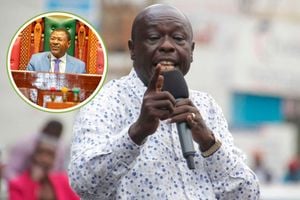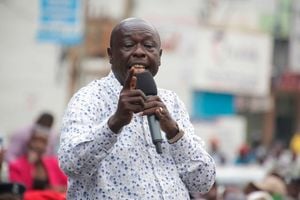
Former Deputy President Rigathi Gachagua.
Geoffrey Rigathi Gachagua’s political journey reads like a man always in a hurry and not ready to take “No” for an answer.
After serving just one term as Mathira MP, the 59-year-old bulldozed his way into becoming President William Ruto’s running mate during the August 9, 2022 General Election.
It is now a “public secret” that Mr Gachagua was not the overwhelming choice by the Kenya Kwanza political leaders, with Interior Cabinet Secretary Kithure Kindiki being the favoured one.
And during the swearing-in at Kasarani in September 2022, Mr Gachagua was a step ahead of then Registrar of the Judiciary Ann Amadi, who was administering the oath of office.
For a man who rose to the country’s second-most powerful seat and a heartbeat away from the presidency just five years after being elected to Parliament, the meteoric rise of Mr Gachagua was accompanied by an equally swift and dramatic fall.
Born on February 28, 1965 in Ruguru village, Mathira, Nyeri County, Mr Gachagua’s political life mirrors that of Simon Makonde, a famous character in folk tales. It is the story of a man who was born on a Monday, named on Tuesday, baptised on Wednesday, married on Thursday, fell ill on Friday, died on Saturday and was buried on Sunday.
Mr Gachagua, who was elected MP for Mathira in 2017, served only five years in the National Assembly, rose to become the country’s 12th principal assistant to the President in the 2022 elections, and fell after just two years in office.
He campaigned with President William Ruto, his political buddy-turned-foe, on a platform of economic transformation and inclusivity, especially for people at the bottom of the pyramid—the hustlers.
They won in the first round with 50.4 per cent of the vote, defeating their closest challenger, Azimio la Umoja One Kenya candidate Raila Odinga, who had teamed up with Narc Kenya leader Martha Karua in the race.
But barely two years in office, Mr Gachagua’s relationship with Dr Ruto soured, with the impeached DP embarking on whirlwind political tours in his Mt Kenya backyard where his allies accused the President of betrayal.

Deputy President Rigathi Gachagua addresses a congregation at Kimugul Primary School grounds on August 17, 2024.
Mr Gachagua had earlier this month, during a tour of Meru County, warned of what he described as an elaborate plot to divide the vote-rich Mt Kenya region.
“Some people are lying to the President that we can remove Gachagua and have someone else, that the people of Mt Kenya will forget because we still have three years to the next election.
“I want to tell him that the people of Mt Kenya will not forget the atrocities committed against them. They have never forgotten the atrocities committed against them by the colonialists and former President (Daniel) Moi, and they will not forget what they are going through now. They will always carry it in their hearts,” Mr Gachagua said.
But the President’s allies had accused him of disobedience to his boss.
Greek mythology tells the story of Icarus, the son of Daedalus, who ignored his father’s instructions not to fly too close to the sun as the two fled from King Minos. Intoxicated by the experience of flight, Icarus flew higher and higher and when the wax in his wings melted, he fell into the sea and drowned.
The myth seems to sum up the plight of Mr Gachagua, who last night suffered the ignominy of becoming the first DP to be removed from office by way of impeachment.
A one-term MP who was catapulted by a twist of fate to become Dr Ruto’s United Democratic Alliance running mate in 2022 and eventually Deputy President, Mr Gachagua appears to be someone who tried to “reach too high too soon” and it backfired.
Barely six months in office, the former Mathira MP declared himself the guardian of State House, his job to ensure that those who did not support Kenya Kwanza were barred from all plum government positions.
Accordingly, his job was to decide who was ahead of whom in the distribution of government positions. He openly described the new government as a company of shareholders where some Kenyans are majority shareholders while others have no shares, perhaps taking cue from his boss.
Unapologetically, he said government appointments and contracts were reserved for those who voted for the ruling regime, with the least consideration given to members of the opposition.
“Your (opposition) time to reap will come one day on what is left after those who sowed have finished reaping,” the DP said during a speech in Kericho in February 2023. “You have invested in this government and you must reap. You have sown, tilled, fertilised and irrigated and now it is time to reap.”
The self-proclaimed “man of truth” ended up being the first to reap from the seeds he had sown since taking over as DP.
Finding himself increasingly isolated in Kwanza’s administration and with talk of impeachment growing, the self-proclaimed son of the Mau Mau decided to take the fight to his boss. He claimed that from the meetings he held in his Mt Kenya backyard, the people of the region were not interested in seeing him out of government.
“I have been touring the Mt Kenya region and my people on the ground have told me not to be shaken,” said the man who described himself as a “listener of the ground”.
He went on to challenge the President to clarify whether it was the Ford Foundation or officials from his office who funded the deadly Gen Z protests in June and July this year, which took place in 35 counties.

Deputy President Rigathi Gachagua at the Presbyterian Church of East Africa Kayole Parish on July 21.
“After all, the President said they were sponsored by the Ford Foundation. So who sponsored the Gen Zs, was it the people in my office or the Ford Foundation?” he asked.
Mr Gachagua went on to say that any impeachment motion could only be sanctioned by the President.
“Any impeachment motion against me must be endorsed by the President and if he tells them to throw me out, then Kenyans will lose faith in him,” he said.
He cautioned the President to tread carefully, saying the people of Mt Kenya hate betrayers and that he risked losing the trust and support of the region if the impeachment plot went ahead.
The DP reminded his boss that he was the biggest beneficiary of the Mt Kenya people’s distaste for betrayal and as such he should avoid the politics of betrayal.
In the run up to his impeachment motion, Mr Gachagua had been on the receiving end of attacks from Dr Ruto’s political allies from the Mt Kenya region who accused him of jeopardising local development projects by allegedly fomenting rebellion in the government.
This later led to several elected leaders from the region and its “diaspora” declaring Prof Kindiki, who hails from Mt Kenya East, as their spokesman. They argued that the absence of a centralised representative had hampered efforts to advance the region’s agenda.
Believed to have presidential ambitions of his own, which may now be dashed by his ouster, he finds himself under the curse of the Kenyan vice-presidency or deputy presidency.
Of the 12 people who have served in the role since independence, all but four have had a public falling out with the President or faced some form of mistreatment by people close to their boss.
They include Joseph Murumbi, who officially resigned in 1966 citing ill health; Musalia Mudavadi, who served for three months in 2002; Kijana Wamalwa, who died in office in 2003; and Moody Awori, who succeeded Wamalwa for the remainder of Mwai Kibaki’s first term until 2008.
Three of the outliers - Murumbi, Wamalwa and Mudavadi - were in office for no more than nine months each.












